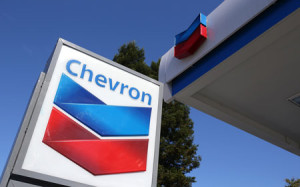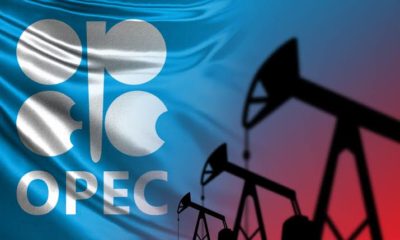Oil
Chevron Posts First Loss Since 2002

Joseph BAMIDELE
CHICAGO IL,-OPEC’s market-share war is inflicting more pain than the world’s top tier of oil producers have felt in at least 13 years.
Chevron Corp., the first super-major oil producer to report fourth-quarter results, posted its first loss since 2002 on Friday and said it’s bracing for a review of its credit rating. A glut of crude from the Persian Gulf and North American shale fields has collapsed prices, forcing the company to write down the value of its fields. Chevron’s results may presage a wave of writedowns next week as the other super-majors begin disclosing fourth-quarter results. Exxon Mobil Corp. and BP Plc report Feb. 2.
 Chevron followed smaller rivals including Hess Corp. and Murphy Oil Corp. in registering deep losses this week as the Organization of Petroleum Exporting Countries’ effort to squeeze higher-cost shale explorers out of the market enters its 21st month. Despite the red ink, Chevron still plans to shell out $2 billion in dividends to shareholders in about six weeks to fulfill a promise to protect payouts at all costs.
Chevron followed smaller rivals including Hess Corp. and Murphy Oil Corp. in registering deep losses this week as the Organization of Petroleum Exporting Countries’ effort to squeeze higher-cost shale explorers out of the market enters its 21st month. Despite the red ink, Chevron still plans to shell out $2 billion in dividends to shareholders in about six weeks to fulfill a promise to protect payouts at all costs.
“They are one of the few companies with the credit rating and the balance sheet to tolerate these prices for the short term and still pay a dividend,” Brian Youngberg, an analyst at Edward Jones & Co. in St. Louis, said in a telephone interview on Friday.
Surprise Loss
Chevron probably will cut spending on new projects for a fourth consecutive year in 2017 to as little as half the $41.9 billion it spent in 2013, the company said in a slide presentation published on its website. A decision on an expansion of the sprawling Tenghiz oil field in Kazahkstan is on hold, as is development of Chevron’s Buckskin and Moccasin discoveries in the U.S. Gulf of Mexico, Chief Executive Officer John Watsonsaid during a conference call with analysts on Friday.
The company expects that its debt profile will be reviewed by credit-rating agencies in coming months as scrutiny of the entire industry intensifies amid the worst oil-price crash in a generation, Chief Financial Officer Patricia Yarrington said during the call.
Chevron’s fourth-quarter net loss was $588 million, or 31 cents a share, compared with profit of $3.5 billion, or $1.85, a year earlier, the San Ramon, California-based company said in a statement. The per-share result was worse than any of the 22 analysts in a Bloomberg survey whose estimates ranged from gains of 29 cents to 63 cents.
Oil
NNPC Targets 60% Methane Emission Reduction By 2031
The Nigerian National Petroleum Company Limited (NNPC) has unveiled a bold strategy to reduce methane emissions in the oil and gas sector by 60% by 2031, with an ultimate goal of achieving net-zero emissions by 2060.
This announcement reinforces Nigeria’s leadership role under the Global Methane Pledge initiative and its commitment to tackling climate change.
The Group Chief Executive Officer of NNPC, Mele Kyari, disclosed these plans during a meeting on Thursday with Robert Leahman, the U.S. State Department’s Global Methane Program Manager, and a delegation from Deloitte.
READ MORE: Atiku Gloats Over AUN’s Achievements Ahead Of 20th Anniversary
The discussions, held at the NNPC Towers in Abuja, focused on collaborative efforts to reduce methane emissions through innovative and sustainable practices.
“Reducing methane emissions is not just an environmental necessity but also a strategic imperative for Nigeria’s energy transition. We are leveraging partnerships to adopt global best practices and innovative solutions,” Kyari stated.
Key among these efforts is a pilot project in the Niger Delta, aimed at establishing emissions baselines, mitigating methane leaks, and promoting sustainable operations across Nigeria’s energy sector.
The project, a partnership between NNPC, Deloitte, and the U.S. Bureau of Energy Resources, will utilize data-driven methodologies to pinpoint and address methane hotspots.
Robert Leahman commended Nigeria’s proactive stance, describing it as a benchmark for other nations on the continent.
“Nigeria’s leadership under the Global Methane Pledge sets a standard for the continent. These initiatives will not only help reduce emissions but also drive sustainable development in the energy sector,” he said.
Kyari highlighted the broader benefits of addressing methane emissions, noting its significance for both environmental protection and economic efficiency.
“This collaboration is a game-changer. By addressing methane leaks, we’re reducing waste, saving costs, and protecting the environment. It’s a win-win for our economy and the planet,” he added.
Oil
FG Introduces New Incentives To Revitalize Nigeria’s Oil & Gas Industry
In a strategic move to revitalize Nigeria’s oil and gas sector, the Federal Government has unveiled two key fiscal incentives aimed at attracting investment and enhancing energy security.
The announcement was made by Mr. Wale Edun, the Minister of Finance and Coordinating Minister of the Economy on Wednesday.
The first initiative, the Value Added Tax (VAT) Modification Order 2024, introduces critical exemptions for essential energy products and infrastructure, including Diesel, Feed Gas, Liquefied Petroleum Gas (LPG), Compressed Natural Gas (CNG), Electric Vehicles, Liquefied Natural Gas (LNG) infrastructure, and Clean Cooking Equipment.
Read Also: Atiku Calls For Rotational Presidency Across Nigeria’s Geopolitical Zones
These exemptions are designed to reduce living costs for Nigerians, promote energy security, and accelerate the transition to cleaner energy alternatives.
The second initiative, the Notice of Tax Incentives for Deep Offshore Oil & Gas Production, offers new tax relief options for deep offshore exploration projects.
This measure aims to position Nigeria’s deep offshore basin as a premier destination for international oil and gas investments, boosting the country’s appeal to foreign investors.
These reforms are part of a broader set of policy initiatives, known as Policy Directives 40-42, endorsed by President Bola Ahmed Tinubu.
The directives reflect the administration’s commitment to fostering sustainable development in the energy sector and enhancing Nigeria’s competitive edge in the global oil and gas market.
Business
Tinubu set to approve ExxonMobil-Seplat oil deal, expands CNG bus initiative

By Yemie Adeoye
NIGERIA’s President Bola Tinubu has announced that the protracted ExxonMobil-Seplat upstream oil divestment will be formally approved by the Minister of petroleum within a matter of days, just as he announced his government’s intention to expand the Compress natural Gas, CNG buses initiative.
The President who stated this during his Independence day nationwide broadcast stated that the move is in line with his administration’s commitment to free enterprise, free entry and free exit in investments which is the hallmark of his administration investment policy.
“Fellow compatriots, our administration is committed to free enterprise, free entry, and free exit in investments while maintaining the sanctity and efficacy of our regulatory processes. This principle guides the divestment transactions in our upstream petroleum sector, where we are committed to changing the fortune positively. As such, the ExxonMobil Seplat divestment will receive ministerial approval in a matter of days, having been concluded by the regulator, NUPRC, in line with the Petroleum Industry Act, PIA. This was done in the same manner as other qualified divestments approved in the sector.”
The President also seized the opportunity to plead with Nigerians to be patient with his administration’s reform policies. “As your President, I assure you that we are committed to finding sustainable solutions to alleviate the suffering of our citizens. Once again, I plead for your patience as the reforms we are implementing show positive signs, and we are beginning to see light at the end of the tunnel”.
“Our energy transition programme is on course. We are expanding the adoption of the Presidential Initiative on Compressed Natural Gas for mass transit with private sector players. The Federal Government is ready to assist the thirty-six States and FCT in acquiring CNG buses for cheaper public transportation.
Fellow Nigerians, while we are working to stabilise the economy and secure the country, we also seek to foster national unity and build social harmony and cohesion. Our economy can only thrive when there is peace”. he enthused.
























